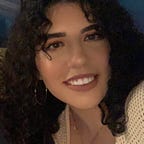Airport Protocol
By: Tamara Al-Qaisi-Coleman
When the TSA agent approached I knew the drill. Don’t argue, just do as he says. The man takes me out of the almost empty line of people stumbling as they take off their shoes and belts. My best friend beside me is confused as to why I have to go into a secluded side area, we were traveling to Portland together for AWP 2019. My suitcase had to go under a larger more intense machine, even after that they searched my backpack. I was getting dirty looks from the man behind the machine. I smiled and acted oblivious. Like it didn’t bother me. By this point in my life I’m unfazed by these moments.
To most people a trip to the airport is about worrying if you’re going to make your flight, or getting a window seat, or even praying that no one is in the seat next to you. For me and my fellow Arab and Muslim presenting cohorts it’s about getting to the airport early enough to go through the “random selection” protocol in time to make my flight.
My head of big black curls, thick eyebrows (formerly a uni brow), and other undeniably Arab features matched with every government document saying “Born in Kuwait, Kuwait” is every TSA agent’s dream. A chance to be the next big hero who saves the world from a terrorist. On the few instances they find out I’m Iraqi they all but kiss the floor at my feet. To see their faces so full of excitement and anticipation fall to disappointment when they only find books and tightly rolled clothing is a favorite pass time of mine. An Iraqi trying to make it through George Bush Intercontinental Airport unscathed by the cruelty of the US government is unheard of and a dark comedy in title alone.
When traveling with my family it was different, especially when I was young and my face was still deciding which parent it would morph into. My father is a part Native American/Black man from Norfolk, Virginia. His southern vernacular and drawl is barely audible, but there. His resolute ‘Americanness,’ Irish surname, foresight to always try and get TSA pre-check, and sheer luck hid my mother’s clear Iraqi-Arab roots and prevented a decent chunk of random checks. When I started traveling alone, however, I had to learn how to deal with those situations on my own. There is nothing you can say or do to change minds already made up about you.
This idea of identity. How to identify yourself versus how others see you has always been a struggle for me. I don’t present like a typical mixed person in the eyes of the public. Even though I was born with American citizenship I was not born on American soil. My mother was a naturalized citizen by marriage. Grew up in war, pushed out of her family’s home in Baghdad and to Kuwait by Saddam, and spent her entire childhood dreaming of America.
I was told by the very white peers of my childhood that I was a “a cruel joke” and the universe was sitting back and having a laugh at my expense. I even had a guy I dated tell me that I was perfect because I had the body of a black woman and the pale-olive under toned complexion of one of the Middle eastern porn stars he liked. I learned two things from that situation: I would never be seen as what I actually was to people who didn’t know me or my family and that I could never date a white guy again.
To grow up in a family where everyone thought I was adopted just furthered my separation from my parents and siblings. I cling to my Arab culture tightly. I studied Middle Eastern History in University and translate Arabic poetry and literature. I’ve spent my entire writing career writing from the perspective of the Arab-American experience even when that same community that I grew up in and connect with sees me as an outsider.
In this new age of social media you can’t be two things and only look like one of those things. Twitter will cut your throat. Complete strangers will feel the need to tell you who you are. The world demands you to choose and only be that one thing. If you aren’t a perfect representation of that label the world has forced upon you then you are wrong.
